House of Lords debates veterinary workforce crisis

The House of Lords discussed the availability of vets in the UK following Brexit.
The lack of qualified veterinary professionals coming into the industry went under the spotlight in the House of Lords recently, with discussions about the availability of vets following Britain's exit from the EU.
According to the The Rt Hon Lord Wigley, the number of EU-registered vets coming to work in the UK since Brexit has fallen by 68 per cent - down from more than 1,100 in 2019 to just 364 last year. Lord Wigley called for more funding to expand the number of UK university places for veterinary students.
There has been a shortage of UK vets for a long time, but overseas veterinary graduates seeking experience could readily fill the void.
During the discussion, Fiona Ferelith Hodgson, Baroness Hodgson of Abinger, asked a question on behalf of the Animal Health Professions Register (AHPR). The AHPR wanted to know whether the government had considered some of the allied professions - such as chiropractic, osteopathy and physiotherapy - for treating musculoskeletal problems in animals, especially horses and dogs.
Baroness Hodgson stated that all of these professions are well qualified, evidence-based and self-regulated and that this would enormously ease the pressure on veterinary practices. Richard Benyon, the Rt Hon Lord Benyon, acknowledged that these practices had an impact on animal welfare and dealing with animal illnesses and agreed that more trained professionals are needed in the veterinary profession.
Liz Trowman, chair of the AHPR, has been working with Baroness Hodgson to highlight the need for more trained professionals and believes this is a very positive step.
"It is a start. Baroness Hodgson raised a question in the lords on our behalf, and although we are not directly referenced in this, she discussed it with me beforehand and I think it is a really positive step,” she said. “We now need further discussion between government and the BVA to move things forward".
Lord Benyon noted that there are new vets coming into the profession from the University of Surrey scheme, which introduced a few years ago.
“Since then, we have new schools appearing at Harper Adams and Keele, the University of Central Lancashire and the Scottish royal colleges, and a collaboration between Aberystwyth University and the Royal Veterinary College. This will bring on stream new vets, trained in this country, to work here, alongside other measures we are bringing in to resolve the shorter-term problems,” he said.



 The Veterinary Medicines Directorate (VMD) is inviting applications from veterinary students to attend a one-week extramural studies (EMS) placement in July 2026.
The Veterinary Medicines Directorate (VMD) is inviting applications from veterinary students to attend a one-week extramural studies (EMS) placement in July 2026.